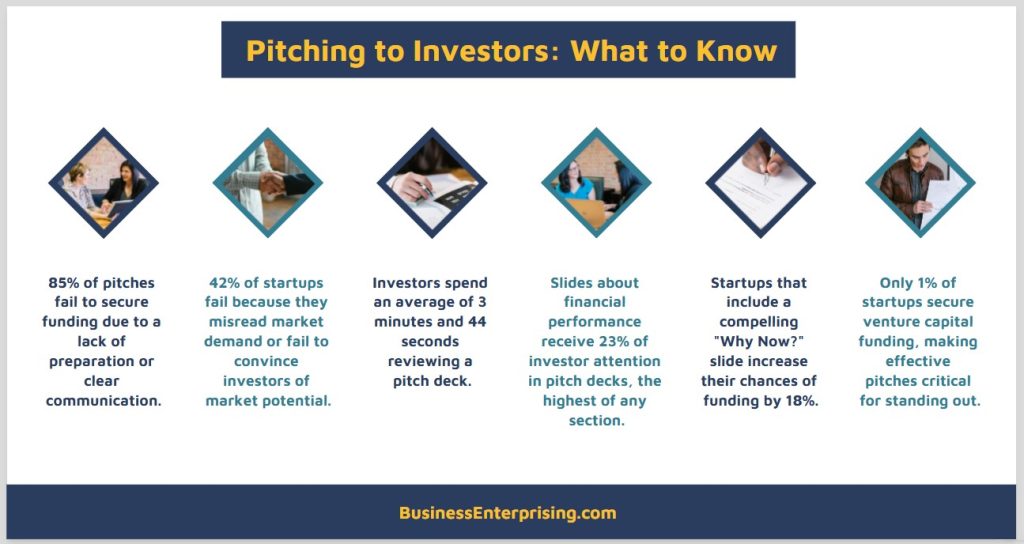
Preparation plays a big role in making a strong impression. By understanding your audience, you can tailor your pitch to their interests and priorities. Clear communication and thoughtful delivery help you stand out and keep their attention. With the right strategy, your pitch can inspire confidence and pave the way for lasting success.
Understanding Your Audience: Researching Investors
Understanding your audience is a critical step when pitching to investors. Investors come with diverse interests, expertise, and portfolios. Tailoring your pitch to align with their specific focus increases your chances of capturing their attention. Start by researching their past investments, industries they support, and their long-term goals. This insight allows you to present your business in a way that resonates with their priorities.
Finding the right investors is just as important as crafting a strong pitch. Look for investors who have experience in your industry and a track record of supporting businesses like yours. Publicly available data, industry events, as well as professional networks can help you identify these prospects. By targeting investors who align with your business model, you increase the likelihood of a meaningful partnership.
When pitching to investors, show that you understand their needs and how your business aligns with their objectives. Discussing past successes, such as previous funding rounds or market traction, builds confidence in your capability. Make the conversation about shared goals. This approach fosters trust and creates a compelling case for their investment.
Crafting a Compelling Story
Storytelling is a powerful tool when pitching to investors. A well-crafted story engages their attention and makes your business memorable. People connect emotionally to stories, which helps you stand out in a sea of data-heavy presentations. A compelling narrative also makes complex ideas easier to understand, keeping your audience focused and invested.
Your story should highlight your business vision and the impact you aim to create. Start by presenting the problem your business solves and how it affects real people. Then, introduce your solution, showing how it addresses the issue in a meaningful way. Use examples or testimonials to bring your vision to life, as this makes your story relatable and authentic.
When pitching to investors, frame your story around growth and opportunity. Emphasize the potential for long-term success and the unique value your business provides. Tie your narrative to their goals, demonstrating why your vision aligns with their interests. By crafting a story that balances logic and emotion, you create a pitch that inspires both trust and enthusiasm.
Presenting a Clear Value Proposition
Presenting a clear value proposition is essential when pitching to investors. You must articulate the problem your business solves as well as why it matters. Investors want to understand the need for your product or service. By clearly defining the issue, you highlight the importance of your solution.
Your solution should stand out by addressing the problem in a unique way. Focus on what makes your approach different and effective. Investors want to see why your business has the potential to succeed where others might fall short. Use data or customer feedback to reinforce the value of your offering.
Market potential is another key aspect of your value proposition. Demonstrate the size of your target market as well as its growth opportunities. Highlighting demand strengthens your case for investment. To stand out further, explain your competitive advantage. Show how your business is positioned to outperform competitors. By presenting a compelling value proposition, you build investor confidence in your business’s success.
Demonstrating Financial Viability
Demonstrating financial viability is essential when pitching to investors. Investors need to see clear, reliable data to evaluate your business. Present key financial metrics such as revenue, expenses, and also profit margins in an organized format. Use charts or graphs to make complex numbers easier to understand.
Projections should reflect realistic growth based on current performance and market trends. Highlight expected revenue growth, customer acquisition costs, and break-even timelines. These details provide a roadmap for how your business plans to scale effectively. Include data that supports your assumptions, as this builds trust and credibility.
You also need to showcase a clear path to profitability or ROI. Investors want to know how as well as when they will see returns. Address potential risks and how you plan to manage them. This shows that you have thought through every aspect of your financial strategy. By communicating financial viability clearly, you instill confidence and make your pitch more compelling.
Mastering the Pitch Delivery
Mastering the pitch delivery is just as important as the content itself. Your slides should be visually engaging but not overwhelming. Use clean layouts, minimal text, as well as high-quality visuals to emphasize your key points. This keeps your audience focused on your message rather than reading dense slides.
Keep your presentation concise and to the point. Investors value their time, so aim to communicate your ideas clearly and efficiently. Practice your delivery to ensure a steady pace and confident tone. Using transitions effectively between topics helps maintain their interest throughout your pitch.
When pitching to investors, your speaking skills play a major role. Maintain eye contact, use natural gestures, and speak with clarity. Practice answering tough questions to handle the Q&A session with confidence. If objections arise, address them calmly and with factual responses. This approach builds trust and shows you’re prepared. A well-delivered pitch not only shares your vision but also strengthens your credibility as a business leader.
Building Credibility and Trust
Building credibility and trust is essential when pitching to investors. Transparency is a key factor in earning their confidence. Be honest about challenges and risks your business faces. Offering realistic solutions shows that you have a clear understanding of your market and strategy.
Strong team dynamics also play a major role in gaining trust. Highlight the experience and expertise of your team members. Investors want to see that your team can execute the business plan effectively. A cohesive and skilled team makes your business more appealing as well as demonstrates your ability to succeed.
Proof of traction is another important way to build trust. Show data that reflects customer interest, revenue growth, or partnerships. These metrics provide tangible evidence of progress. When investors see results, they are more likely to believe in your business.
Follow-up communications after your pitch help maintain momentum. Send a thank-you note and provide additional information if requested. Address questions quickly and thoroughly to keep the conversation moving forward. Consistent and professional communication reinforces your reliability and also builds stronger relationships with potential investors.
Conclusion
Pitching to investors is about more than presenting your business idea. It’s about building trust, showing value, and creating a connection. By understanding your audience, crafting a compelling story, and presenting clear financials, you position yourself for success. Strong delivery and transparent communication reinforce your credibility and help gain investor confidence.
Follow-through is just as important as the pitch itself. Maintain open communication and also provide timely updates to keep investors engaged. Each interaction is an opportunity to strengthen your case and build lasting relationships. With preparation and focus, you can turn a great pitch into meaningful partnerships.



